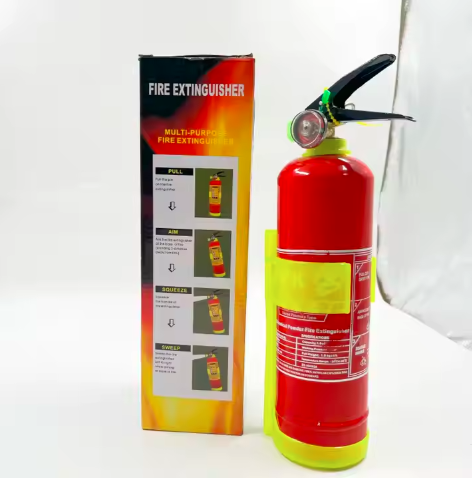A fire extinguisher for car is an essential safety device that every vehicle owner should have.
Car fires can be caused by electrical faults, fuel leaks, overheating, or accidents, and having the right fire extinguisher for car can prevent catastrophic damage and save lives.
In 2022, portable fire extinguishers accounted for 65% of the overall market share.
With various types of extinguishers available, selecting the best fire extinguisher for car is crucial to ensure effectiveness in an emergency.
Why You Need a Fire Extinguisher for Car
A fire extinguisher for car is not just a regulatory requirement in some regions but a critical safety investment.
Fire extinguishers are effective in eliminating fire risks 93.5% of the time they are employed.
Car fires escalate quickly, and the ability to respond immediately can prevent extensive damage.
Here are some reasons why having a fire extinguisher for car is essential:
- Prevents small fires from spreading
- Ensures safety in case of electrical malfunctions
- Complies with legal requirements in various countries
- Protects passengers and property
- Enhances preparedness during road emergencies
Types of Fire Extinguishers for Cars
There are five primary categories of fire extinguishers: water, CO2, powder, foam, and chemical extinguishers.
Each type is designed to tackle different types of fires.
The most suitable types for vehicles include:
1. Dry Powder Fire Extinguisher
This is the most common fire extinguisher for car and is effective against Class A, B, and C fires. It works by smothering flames and interrupting the chemical reaction of the fire.
2. Foam Fire Extinguisher
A foam-based fire extinguisher for car is effective against flammable liquid fires (Class B) and is commonly used for gasoline and diesel fires. However, it is not suitable for electrical fires.
3. CO2 Fire Extinguisher
A CO2 fire extinguisher for car is ideal for electrical fires and Class B fires. It works by displacing oxygen and cooling the flames but is not effective against solid combustible materials.
4. Water Mist Fire Extinguisher
This newer technology is an all-round fire extinguisher for car, safe for electrical and fuel-based fires. It cools the fire and reduces oxygen levels.
5. Halotron Fire Extinguisher
A Halotron fire extinguisher for car is non-corrosive, making it ideal for electrical and fuel fires. It leaves no residue and is environmentally friendly.
Choosing the Best Fire Extinguisher for Car
Selecting the best fire extinguisher for car is crucial for ensuring safety.
Here are the key factors to consider:
1. Type of Fire
Different extinguishers are designed for different types of fires. Consider the risks your vehicle may face:
- Class A: Solid combustibles like paper, cloth, and wood (rare in vehicles).
- Class B: Flammable liquids such as gasoline and diesel.
- Class C: Electrical fires from wiring, batteries, or short circuits.
A dry powder extinguisher is often the best option as it can handle Class A, B, and C fires effectively.
2. Size & Weight
A compact, lightweight fire extinguisher for car is essential for easy handling and storage.
The most common sizes include:
- 1kg fire extinguisher – Ideal for small cars and everyday drivers.
- 2kg fire extinguisher – Suitable for larger vehicles or those carrying flammable cargo.
- 5kg fire extinguisher – Typically used for trucks and heavy-duty vehicles.
A 1kg fire extinguisher for car is generally sufficient for personal vehicles, while commercial vehicles may require larger sizes.
3. Ease of Use
During an emergency, quick action is crucial. Look for a fire extinguisher for car that is:
- Simple to operate – Extinguishers with a one-touch activation mechanism are preferable.
- Clearly labeled – Easy-to-read instructions ensure proper usage.
- Lightweight – Avoid overly heavy extinguishers that may be difficult to maneuver.
4. Compliance & Certification
Ensuring that your fire extinguisher for car meets international and local safety standards is crucial for reliability and effectiveness during emergencies.
Certified fire extinguishers undergo rigorous testing to guarantee their performance, durability, and safety.
When purchasing a fire extinguisher for car, look for certifications from reputable organizations, such as:
- NFPA (National Fire Protection Association): Establishes guidelines for fire safety equipment, ensuring proper functionality and effectiveness in various fire situations.
- UL (Underwriters Laboratories) Certification: A globally recognized mark of safety, UL-certified fire extinguishers have been tested to meet stringent quality and performance standards.
- BS EN3 (British Standard for Fire Extinguishers): This European standard defines essential criteria for portable fire extinguishers, including labeling, performance, and pressure requirements.
- FRSC (Federal Road Safety Corps) Compliance in Nigeria: The FRSC mandates that all vehicles in Nigeria must carry a fire extinguisher that complies with its safety regulations to enhance road safety.
Certified fire extinguishers not only provide peace of mind but also ensure optimal performance in real-life emergencies.
Choosing a non-certified or substandard product may lead to malfunctions or inefficacy in critical situations.
Always verify the certification labels and documentation before making a purchase.
5. Maintenance & Refilling
A fire extinguisher for car requires regular maintenance to remain effective. Consider the following:
- Check the pressure gauge regularly to ensure it’s fully charged.
- Inspect the extinguisher for physical damage, including rust or cracks.
- Refill or replace after use, even if only partially discharged.
- Follow manufacturer recommendations for annual servicing and inspection.
By choosing a reliable, easy-to-use, and properly maintained fire extinguisher for car, you can ensure your safety on the road and comply with vehicle safety regulations.
Fire Extinguisher for Car in Nigeria
Having a fire extinguisher for car in Nigeria is a legal requirement.
The Federal Road Safety Corps (FRSC) mandates that all vehicles carry a functional fire extinguisher to ensure safety in case of emergencies.
Fire Extinguisher for Car Price
The fire extinguisher for car price varies depending on size, brand, and type.
On average, a standard 1kg fire extinguisher for car costs between $10 and $50, while larger models may cost more.
Fire Extinguisher for Car Price in Nigeria
The fire extinguisher for car price in Nigeria depends on the retailer, location, and type.
A 1kg fire extinguisher price in Nigeria typically ranges from ₦5,000 to ₦15,000, depending on the brand and certification.
How to Use a Fire Extinguisher for Car
Using a fire extinguisher for car correctly is crucial for ensuring its effectiveness in an emergency.
Shockingly, only 52% of individuals have received proper training in fire extinguisher use, yet 93% manage to select the appropriate type for a specific class of fire.
However, knowing how to operate an extinguisher correctly can make the difference between controlling a small fire and facing a major disaster.
To efficiently put out a fire, follow the PASS technique:
- Pull the pin – This unlocks the fire extinguisher and allows you to discharge it.
- Aim at the base of the fire – Direct the nozzle at the source of the flames, not at the flames themselves.
- Squeeze the handle – Press the lever to release the extinguishing agent.
- Sweep from side to side – Move the nozzle in a sweeping motion across the fire until it is completely extinguished.
Additional Fire Extinguisher Safety Tips:
- Maintain a safe distance of at least 6-10 feet from the fire while discharging the extinguisher.
- Use short bursts if the fire is small, preventing unnecessary waste of the extinguishing agent.
- Evacuate immediately and call emergency services if the fire is too large to control.
- Never turn your back on the fire—even if it appears extinguished, it may reignite.
Practicing proper extinguisher use and ensuring all vehicle passengers are familiar with the PASS technique can improve safety and preparedness in emergencies.
Maintenance Tips for Fire Extinguisher for Car
To ensure your fire extinguisher for car is always functional:
- Regularly check the pressure gauge.
- Inspect for physical damage or leakage.
- Keep it securely mounted in an accessible location.
- Replace or refill after use.
- Follow manufacturer guidelines for servicing.
Fire Extinguisher FAQs
1. What is the best fire extinguisher for car?
The best fire extinguisher for car is a dry powder extinguisher as it covers multiple fire types, including fuel and electrical fires.
2. Is a fire extinguisher mandatory for cars?
Yes, in many countries, including Nigeria, having a fire extinguisher for car is a legal requirement.
3. How often should I check my car fire extinguisher?
It should be checked monthly for pressure levels, leaks, and expiry dates.
4. Can I use a home fire extinguisher in my car?
No, car-specific fire extinguishers are designed for vehicle fires, while home extinguishers may not be suitable.
5. How do I store a fire extinguisher in my car?
Mount it securely under the seat, in the trunk, or on the side panel for quick access.
6. Can a fire extinguisher explode in a hot car?
No, high-quality fire extinguisher for car models are built to withstand extreme temperatures.
7. How long does a car fire extinguisher last?
Most car fire extinguishers last between 5-15 years, depending on maintenance and type.
8. What size of fire extinguisher is ideal for a car?
A 1kg to 2kg fire extinguisher for car is recommended for easy handling and storage.
9. Where can I buy a fire extinguisher for car in Nigeria?
You can purchase from auto supply stores, safety equipment retailers, and online marketplaces.
10. What is the 1kg fire extinguisher price in Nigeria?
The 1kg fire extinguisher price in Nigeria ranges from ₦5,000 to ₦15,000, depending on the brand and location.
Conclusion
A fire extinguisher for car is an indispensable safety tool for vehicle owners.
84% of fires never grow large enough to activate sprinkler systems, suggesting that occupants are extinguishing fires in most cases.
Knowing which type to choose, how to use it, and maintaining it properly ensures you’re always prepared for fire emergencies.
Whether you’re looking for the best fire extinguisher for car or checking the fire extinguisher for car price in Nigeria, always prioritize safety and compliance.
Stay safe on the road with a high-quality fire extinguisher for car from 360 AutoSecure.
Browse our selection today and ensure you’re prepared for any emergency!




